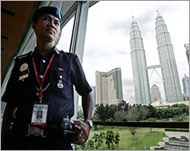Malaysia aims for smart economy
Malaysia has unveiled a $54 billion five-year plan to ease rural poverty, improve education and peel away from low-cost rivals China and India.

The development blueprint for 2006-2010, part of Malaysia’s quest to become a developed nation by 2020, shifts the focus of state spending away from huge construction projects and towards building a smarter economy that doesn’t just compete on cost.
“Strengthening human capital and bringing about a cultural and mindset change will be a key challenge during the plan period,” Abdullah Ahmad Badawi, the prime minister, said as he presented the 9th successive five-year plan to parliament on Friday.
“The next 15 years are even more challenging. The competition for investment and jobs is becoming stiffer. As an open economy, Malaysia is not insulated from an even more competitive environment. We must act faster,” Abdullah said.
Malaysia has turned from a farm-based economy to an electronics manufacturing hub, but is now at a critical stage of its development. One of the first Asian nations to serve as a low-cost production base for Western firms, it is under pressure to make higher-value goods or risk losing out to China and India.
First-class infrastructure
Malaysia has spent 20 years building first-class infrastructure such as a $3 billion airport and a new administrative capital. But critics say some of it wasn’t needed and more money should have been spent on education and helping the rural poor.
In the Ninth Malaysia Plan, the government pledged to cut red tape, improve the investment climate, upgrade public transport, and attract more foreign capital into state projects.
 |
|
Malaysia has modern cities but |
It announced a 6% increase in spending for education and training in an effort to address the dilemma of thousands of unemployed university graduates, who employers say have a poor grasp of the English language, science and mathematics.
Malaysia plans to trim spending on defence to 16.8 billion ringgit from 17.3 billion in the previous five-year period, cut its fiscal deficit to 3.4% of GDP by 2010 from 3.8% in 2005, and expects the economy to grow 6% each year on average until 2010.
Malaysia, Southeast Asia’s third-largest economy after Indonesia and Thailand, has modern cities with state-of-the-art mobile phone services but some of its rural people still lack basic facilities such as clean piped water.